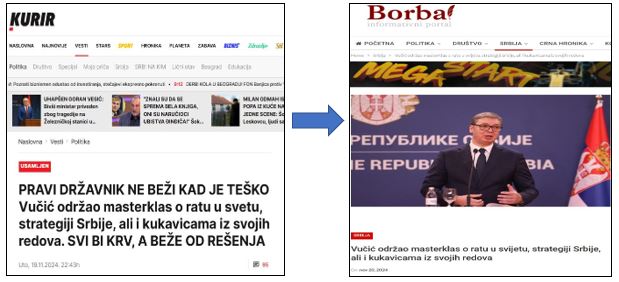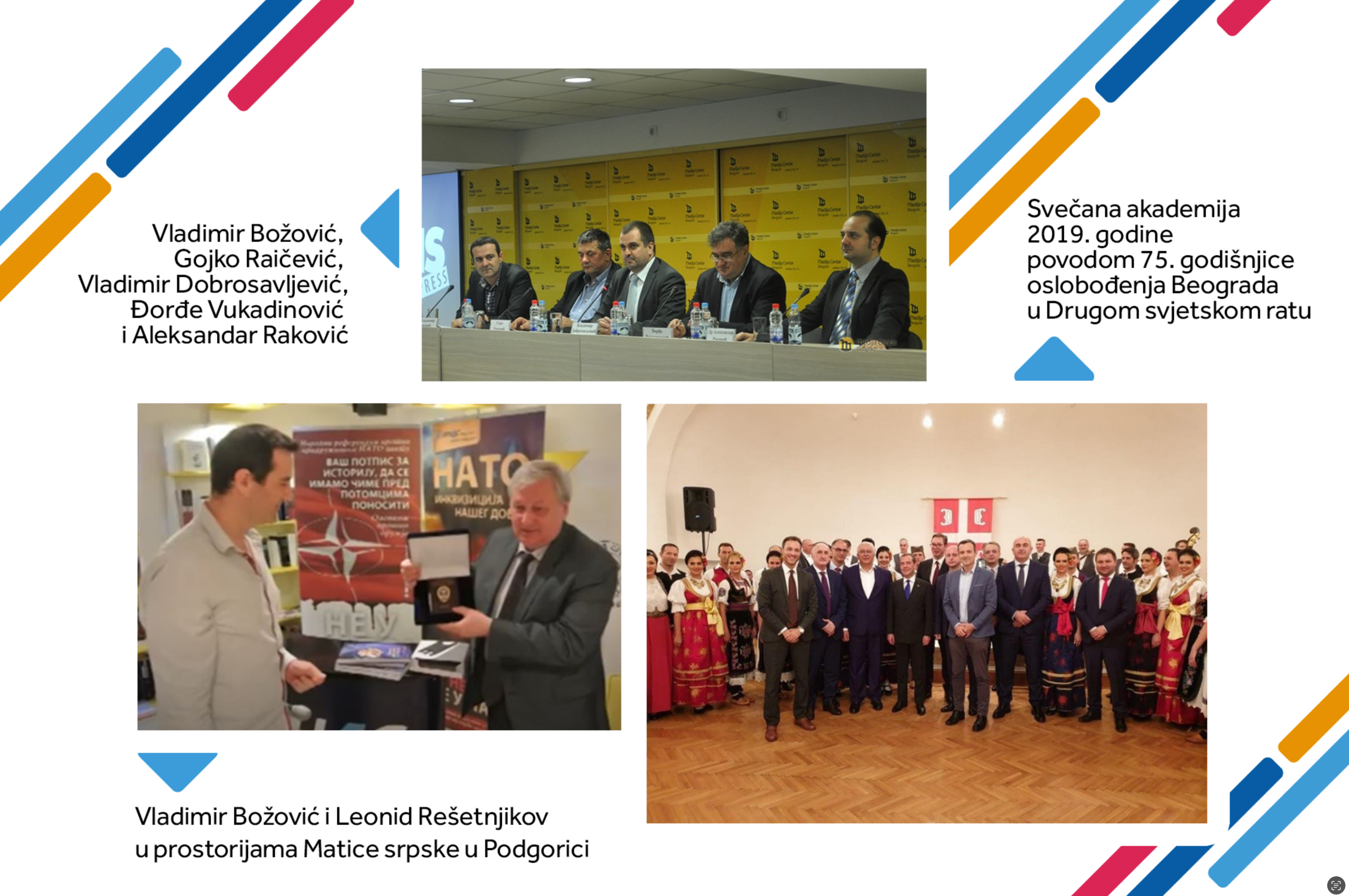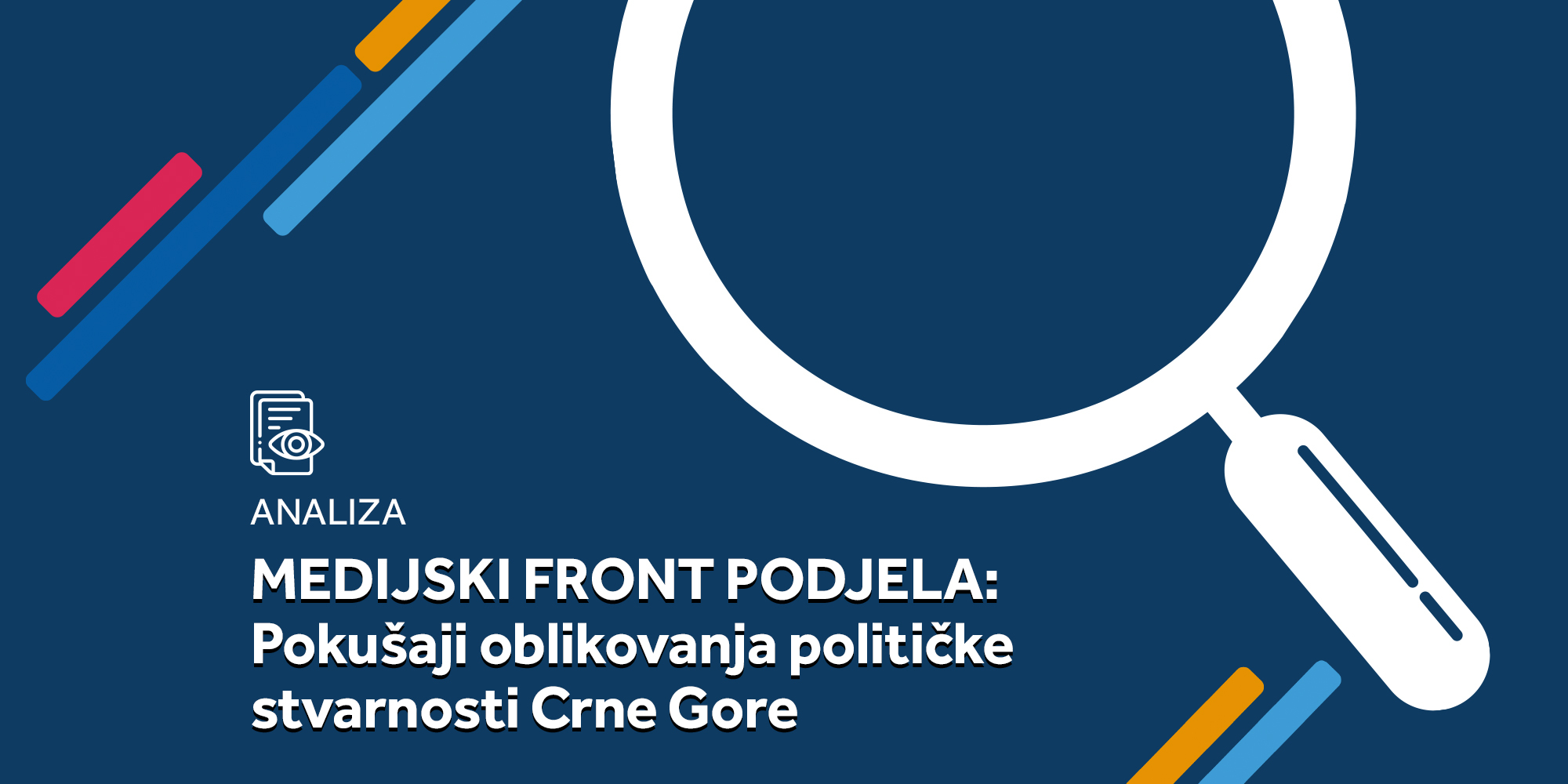Significant socio-political events in Montenegro, the region, and on a global scale serve as triggers for coordinated campaigns by various actors aiming to discredit individuals, erode trust in institutions, and ultimately disseminate subtle propaganda glorifying the regional political policies of the government in Belgrade. Pro-Russian and pro-Serbian media outlets consistently promote narratives and theses that divide and destabilize Montenegrin society. Anti-NATO and anti-Western agendas are prominently featured in numerous headlines and articles published on portals such as Borba, IN4S, and Aloonline.me.
These portals are key media channels for spreading pro-Russian and pro-Serbian narratives and manipulating information within Montenegro’s media space. Their activities often rely on biased and subjective reporting, as well as the discrediting of organizations, institutions, and individuals who do not align with these media outlets’ editorial stance and values.
The aforementioned portals frequently disseminate anti-Western narratives and propaganda targeting NATO, the European Union, and the political West. They tendentiously claim that Montenegro was forced into NATO against the will of its people and that membership in the alliance has led to a loss of the country’s sovereignty. At the same time, these portals promote narratives that justify Russia’s aggression against Ukraine and glorify Russian officials. The Digital Forensic Center (DFC), in its previous analyses, identified an increase in manipulation and disinformation during socio-political processes, particularly elections, along with the continuous publication of sensationalist news aimed at discrediting pro-Western actors and institutions. A recent example is a critical comment about Radmila Šekerinska, the newly appointed Deputy Secretary General of NATO, Mark Rutte, and a former politician from North Macedonia. The article, published on the Borba portal on November 19, 2024, seeks to undermine her appointment to a high NATO position and the Alliance as a whole. The text makes claims about her alleged connections to corruption, crime, political incidents, and controversial statements, but these accusations are presented without arguments or credible sources to substantiate them. Šekerinska’s career is portrayed in a one-sided manner, focusing on hard-to-verify negative aspects of her past roles while omitting any objective or balanced insight into her actions.
On the other hand, these portals are markedly inclined toward promoting the policies of the Serbian regime and President Aleksandar Vučić. This is evident in their frequent republishing of content from tabloids controlled by the regime in Belgrade. Additionally, they often republish content from RT Balkan and Sputnik Srbija—branches of Russian media under European Union sanctions, which Montenegro has also adopted. The articles on these portals commonly feature narratives that glorify the cult of personality surrounding Aleksandar Vučić, portraying him as a regional leader and guarantor of peace. An example is an article published by Borba on November 20, 2024, titled Vučić Held a Masterclass on War in the World, Serbia’s Strategy, and Cowards in His Ranks, which was sourced from the Serbian tabloid Kurir. This text exemplifies heavily biased discourse and political propaganda aimed at glorifying Vučić’s character and achievements while discrediting his political opponents. Through the use of metaphors, the article seeks to depict Vučić as a skilled and fearless leader steering Serbia through challenging times. Such narratives not only reinforce Vučić’s image but also undermine democratic debate by marginalizing dissenting voices and promoting a one-dimensional portrayal of leadership and governance in Serbia.

The propaganda efforts of pro-Serbian structures operate through multiple channels, relying on a large volume of content from pro-Russian media that is disseminated in Montenegro via related portals and media outlets. Following the U.S. administration’s decision to authorize Ukraine to target Russian sites using American missiles, a coordinated campaign by Russian media and political actors ensued. Russian state media, government-aligned tabloids in Serbia, and pro-Serbian portals in Montenegro collectively amplified pro-Kremlin narratives that incite fear of a NATO-Russia conflict while portraying Russia—the actual aggressor—as a victim of Western policies. On November 19, 2024, Serbian President Aleksandar Vučić fueled this narrative by discussing the potential for nuclear conflict and the number of shelters in Serbia. He emphasized that every next step leads to nuclear war and warned that Putin will not hesitate for a moment if cornered. This fear-mongering and glorification of Russia’s hard power were quickly adopted by pro-government media in Serbia, as well as by pro-Serbian portals such as Borba and IN4S in Montenegro. The disinformation narrative about World War III was further propagated by Milan Knežević, the president of the Democratic People’s Party (DNP), who claimed that the outgoing U.S. president’s decisions were pushing the world toward a global conflict. Apocalyptic claims, which essentially serve as anti-NATO propaganda, were also reflected in misleading headlines such as the one published on Alo.rs: Russian Nukes Falling on Podgorica! This Is the Core of Putin’s New Doctrine, and Revenge Has Already Begun. Such narratives are designed to spread fear, amplify distrust in NATO, and glorify Russia’s military and strategic capabilities, further polarizing the public and destabilizing regional discourse

Exploiting crises to promote disinformation narratives is a specific tactic of pro-Serbian portals and tabloids. The case of the fugitive murderer Alija Balijagić is a striking example of coordinated hybrid activities aimed at undermining trust in state institutions and fostering religious and national intolerance among Montenegrin citizens. On November 4, 2024, the portal Informer disseminated fake information claiming that the fugitive Balijagić was located in a training camp for Islamist militants. On the same day, President Vučić, during the show Ćirilica, stated that Balijagić had become a radical Islamist while in prison, citing intelligence sources from Montenegro. Numerous Serbian security analysts linked the narrative of Balijagić as an Islamist to his alleged attempt to flee to Kosovo, aiming to portray Kosovo as a haven for radical religious extremists.
Propaganda portals leverage media campaigns to mobilize public support through emotional manipulation and fostering polarization. These campaigns are part of broader hybrid activities aimed at creating animosity toward NATO and the EU among Montenegrin citizens, thereby challenging Montenegro’s Euro-Atlantic future. Currently, such campaigns also serve to divert public attention from internal issues facing Aleksandar Vučić’s regime. The intensified actions of regional media and portals, along with propaganda outlets from Montenegro, reflect the growing ambition of the regime in Belgrade to control socio-political processes in Montenegro. Portals such as Borba and IN4S serve as primary tools for pro-Serbian structures to channel anti-Western and anti-NATO narratives. Their unhindered promotion of hate speech, discrediting politically inconvenient actors, and targeting representatives of the NGO sector positions them as key supports of the authoritarian regime in Belgrade. The synergy between Russian, regional, and pro-Serbian portals and media during crises facilitates the rapid spread of disinformation and propaganda. This coordination aims to destabilize society and weaken trust in institutions and democratic processes, undermining Montenegro’s European integration efforts. This coordinated network consistently employs manipulative techniques, including selective presentation of information, fake news, and sensationalist headlines, to polarize public opinion and support political agendas aligned with the current interests of Aleksandar Vučić’s regime.

